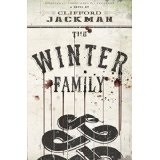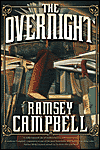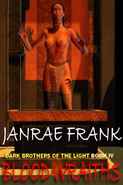
The Forgotten, by Tamara Thorne
Book Review by C. Dennis Moore
Have you read this book?
I was talking to a friend of mine about this book and she pointed out the difference to me between being a good writer and being a good storyteller. I couldn't have put it better myself. Tamara Thorne is a good writer. Not so much on the storytelling, though. For the most part her nouns and adjectives match, she doesn't repeat herself in one sentence more than a couple times in this book, and the prose does fly by pretty rapidly. But, for all its technical accuracy, The Forgotten is one badly constructed book.
The main character, Will Banning, is a psychologist in Caledonia, Calfiornia, which is a small isolated village on the coast. In the book's opening, his office is suddenly bombarded with hundreds of kamikaze birds, dive-bombing his windows, shattering the glass, and leaving a bloody mess. Nice opening. While his office is cleaned and repaired, he uses a small spare office across the hall. That's when his patient load becomes unbearable. Will has so many people coming to him for help every day, he has to cut his sessions to 20 minutes and usually ends up working late. People are reporting seeing ghosts in their houses. Will, the self-proclaimed skeptic, doesn't believe in ghosts and tries to help his patients work through their problems.
Will's own problem is that the ghost of his dead older brother Michael has been whispering to him at night from under Will's bed. He wants to attribute this to his own guilt--Will believes it was he who shot his brother, by accident, 30 years earlier--but Will's cat's sense the presence as well, so what's a skeptic to do? He enlists the aid of his lifetime best friend, and veterinarian (what luck!), Maggie Maewood. Together they try to figure out why so many animals, and people, lately have been so nervous in Caledonia.
The answer lies with Will's other brother, Pete, ex-army, now retired and running Caledonia's cable company. Pete's recently upgraded his equipment to give the citizens even more channels, and this has caused him to have to replace every cable box in town. Unbeknownst to the residents, Pete is still working with the army on Project: Tingler, which releases electromagnetic waves through the television, scrambling a person's brain and bringing on bouts of paranoia. What neither Pete nor anyone else on Project: Tingler had anticipated was the side-effect. These waves also open a circuit in the brain, perhaps, Will explains, the same circuit that's active in schizophrenics, which allows them to receive stimuli the normal mind can't process. (This is a hell of an idea and one I wish I'd thought of.) Does this explain the constant ghost activity in town? Are people just now seeing what's always been there? Does it matter?
Not only did I not think Will and Maggie would have time to learn Pete's secret, I honestly didn't care. I didn't think they would discover his secret before the novel's end because Thorne drug out building up the story so long, it's not until about 20 pages PAST the halfway mark when Will and Maggie even thought to ask "Hey, I wonder if something's going on here." Up to that point, the reader knows exactly what's going on, so it's just a matter of waiting for the characters to catch up. And when you think about it, since the waves are coming in through the television, a good deal of these characters' time is spent just watching TV. I can do that on my own, I don't need to read about other people doing it. And it does NOT carry a novel to the halfway mark well.
And if the sluggish pace weren't enough, the novel's climax consists of a paragraph or two 3 pages before the book is over. And the climax has NOTHING to do with the ELF waves or Project: Tingler! Pete has decided, all of the sudden, to rape Maggie, which he'd attempted when they were teenagers, but she fought back. This time Pete's got a gun, though. So he ties her to the bed and is setting to work. Across town Will tries to call Maggie, but she doesn't answer. Well, that's odd, Maggie always answers her phone. Maybe he should go over there. She doesn't like surprise visits, though. Oh well, he'll go anyway. He arrives, sees Pete's van outside, and decides something's wrong. Will sneaks inside and tries to help Maggie, but Pete, the soldier, is a better fighter and Will fails.
Not to fear though, help arrives from out of the freaking blue, the day is saved, and before there can be any resolution or calming after the "big fight" (I say with a chuckle) . . . the book is over. Hey, wasn't there something here about folks seeing ghosts all over the place? Hmm. Must not have been important. Project: Tingler isn't even revealed to Will and Maggie to be the cause of all the sightings, they just stop when Pete is taken away.
There's absolutely NO build-up to this "climax". If ever a novel could be accused of premature . . . you get the point . . . it would be The Forgotten. Maybe Thorne ran out of things to say. Maybe she wrote herself into a corner and couldn't get out. Maybe she had a deadline she was racing to meet. Whatever the excuse, it's not good enough for the ending of this novel.
And this brings me to my original point, the difference between a good writer and a good storyteller. Thorne can write well enough. There was a scene when one character is dreaming a man has slid into bed with her. She tells the dream to hold her close, but the response comes from the ghost of her armless mother. I have no arms, you know that dear. Why don't you hold me instead? That was some freaky stuff. So, while Thorne CAN write, this book, from a story point of view, was a mess.
I believe there should be a balance in your plot, a nice even spreading out of the story elements. What I don't believe is that you should amble around your plot until the last 5 minutes, throw in a cop-out ending, and call it done, and that's exactly what Thorne did with The Forgotten.
I used to loathe Kevin J. Anderson, the king of the visible plot outline, for his crappy X-Files novels. You could see his plots coming a mile away. But at least you knew he had an idea where it was all going and it all wrapped up nice and tight in the end. Granted, making your outline so obvious the reader can tick off the individual plot points as he reaches them is not the way to go, but at least with those novels you know the author has a point. The Forgotten, however, was an ambling mess, a sad, undeveloped novel, and not the one to bring me back to Thorne in too big a hurry any time soon. This novel read like she started writing one day with a vague idea in her head, some story about ghosts, and then she suddenly realized, "Oh crap, I have a novel due tomorrow. I've got a lot written on this one, I'll tack an ending on it, that'll be good enough."
It's not.
The main character, Will Banning, is a psychologist in Caledonia, Calfiornia, which is a small isolated village on the coast. In the book's opening, his office is suddenly bombarded with hundreds of kamikaze birds, dive-bombing his windows, shattering the glass, and leaving a bloody mess. Nice opening. While his office is cleaned and repaired, he uses a small spare office across the hall. That's when his patient load becomes unbearable. Will has so many people coming to him for help every day, he has to cut his sessions to 20 minutes and usually ends up working late. People are reporting seeing ghosts in their houses. Will, the self-proclaimed skeptic, doesn't believe in ghosts and tries to help his patients work through their problems.
Will's own problem is that the ghost of his dead older brother Michael has been whispering to him at night from under Will's bed. He wants to attribute this to his own guilt--Will believes it was he who shot his brother, by accident, 30 years earlier--but Will's cat's sense the presence as well, so what's a skeptic to do? He enlists the aid of his lifetime best friend, and veterinarian (what luck!), Maggie Maewood. Together they try to figure out why so many animals, and people, lately have been so nervous in Caledonia.
The answer lies with Will's other brother, Pete, ex-army, now retired and running Caledonia's cable company. Pete's recently upgraded his equipment to give the citizens even more channels, and this has caused him to have to replace every cable box in town. Unbeknownst to the residents, Pete is still working with the army on Project: Tingler, which releases electromagnetic waves through the television, scrambling a person's brain and bringing on bouts of paranoia. What neither Pete nor anyone else on Project: Tingler had anticipated was the side-effect. These waves also open a circuit in the brain, perhaps, Will explains, the same circuit that's active in schizophrenics, which allows them to receive stimuli the normal mind can't process. (This is a hell of an idea and one I wish I'd thought of.) Does this explain the constant ghost activity in town? Are people just now seeing what's always been there? Does it matter?
Not only did I not think Will and Maggie would have time to learn Pete's secret, I honestly didn't care. I didn't think they would discover his secret before the novel's end because Thorne drug out building up the story so long, it's not until about 20 pages PAST the halfway mark when Will and Maggie even thought to ask "Hey, I wonder if something's going on here." Up to that point, the reader knows exactly what's going on, so it's just a matter of waiting for the characters to catch up. And when you think about it, since the waves are coming in through the television, a good deal of these characters' time is spent just watching TV. I can do that on my own, I don't need to read about other people doing it. And it does NOT carry a novel to the halfway mark well.
And if the sluggish pace weren't enough, the novel's climax consists of a paragraph or two 3 pages before the book is over. And the climax has NOTHING to do with the ELF waves or Project: Tingler! Pete has decided, all of the sudden, to rape Maggie, which he'd attempted when they were teenagers, but she fought back. This time Pete's got a gun, though. So he ties her to the bed and is setting to work. Across town Will tries to call Maggie, but she doesn't answer. Well, that's odd, Maggie always answers her phone. Maybe he should go over there. She doesn't like surprise visits, though. Oh well, he'll go anyway. He arrives, sees Pete's van outside, and decides something's wrong. Will sneaks inside and tries to help Maggie, but Pete, the soldier, is a better fighter and Will fails.
Not to fear though, help arrives from out of the freaking blue, the day is saved, and before there can be any resolution or calming after the "big fight" (I say with a chuckle) . . . the book is over. Hey, wasn't there something here about folks seeing ghosts all over the place? Hmm. Must not have been important. Project: Tingler isn't even revealed to Will and Maggie to be the cause of all the sightings, they just stop when Pete is taken away.
There's absolutely NO build-up to this "climax". If ever a novel could be accused of premature . . . you get the point . . . it would be The Forgotten. Maybe Thorne ran out of things to say. Maybe she wrote herself into a corner and couldn't get out. Maybe she had a deadline she was racing to meet. Whatever the excuse, it's not good enough for the ending of this novel.
And this brings me to my original point, the difference between a good writer and a good storyteller. Thorne can write well enough. There was a scene when one character is dreaming a man has slid into bed with her. She tells the dream to hold her close, but the response comes from the ghost of her armless mother. I have no arms, you know that dear. Why don't you hold me instead? That was some freaky stuff. So, while Thorne CAN write, this book, from a story point of view, was a mess.
I believe there should be a balance in your plot, a nice even spreading out of the story elements. What I don't believe is that you should amble around your plot until the last 5 minutes, throw in a cop-out ending, and call it done, and that's exactly what Thorne did with The Forgotten.
I used to loathe Kevin J. Anderson, the king of the visible plot outline, for his crappy X-Files novels. You could see his plots coming a mile away. But at least you knew he had an idea where it was all going and it all wrapped up nice and tight in the end. Granted, making your outline so obvious the reader can tick off the individual plot points as he reaches them is not the way to go, but at least with those novels you know the author has a point. The Forgotten, however, was an ambling mess, a sad, undeveloped novel, and not the one to bring me back to Thorne in too big a hurry any time soon. This novel read like she started writing one day with a vague idea in her head, some story about ghosts, and then she suddenly realized, "Oh crap, I have a novel due tomorrow. I've got a lot written on this one, I'll tack an ending on it, that'll be good enough."
It's not.
|
Click here to buy The Forgotten, by Tamara Thorne on Amazon
|
The Forgotten, by Tamara Thorne on Amazon

| More Books You Might Like |
Comment on The Forgotten, by Tamara Thorne
| Comments on The Forgotten, by Tamara Thorne |
| There are no comments on this book. |




